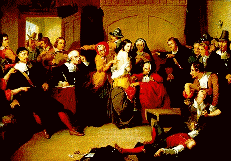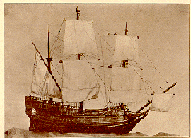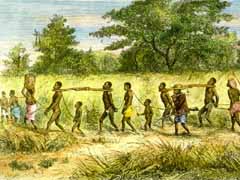


|
|
|
|
CRN 16014
260 Condon Hall, W, 6-8:50
Matthew Dennis
357 McKenzie Hall, 346-4814; mjdennis@darkwing.uoregon.edu
Office Hours: M, 2:30-3:30; W, F, 11-11:50
Introduction
"In the beginning," John Locke wrote in 1690, "all the world was
America." Yet as Locke wrote, much of North America was no longer
"America," if what he meant by that was a pure, pristine,
untransformed state of nature. Permanent English settlement was
nearly a century old, other Europeans had colonized the Americas even
earlier, and Native people had lived on--and transformed--the
continent for thousands of years. If America was a "New World" it was
because colonization transformed it into something as novel to
Indians and to Africans as it was to Europeans.
This course examines the colonial period in American history (to the eve of the American Revolution) in order to understand that strange New World on its own terms as well as to assess the colonial origins of American culture and society. At the core of our inquiries will be the question, "What was colonial about colonial America?" We will investigate how and why colonialism matters in early American history and contemplate American colonialism's long-term implications. History is comprised of both specific (sometimes quite dramatic) events and more prosaic processes, which can unfold gradually but with glacial force. We will study both in the course of five units outlined below in order to comprehend not only the headlines of early American history (e.g., the "discovery" of America, or the Salem witch trials) but the complex stories behind them (Native American cultural development and European expansion, or social and religious trends and gender arrangements in Puritan New England). These stories are strange and complicated-particularly because they are best told from multiple perspectives-but they bear careful scrutiny for anyone interested in American history.
Course Format and
Requirements
This course will combine lecture
with discussion, often weaving the two together to make class
sessions interactive. Lectures will generally build upon, not
simply recapitulate, readings. Students are responsible for
completing reading and written assignments by the time indicated on
the syllabus. These assignments will often provide the basis for
class activity; students are expected to attend all class meetings
and participate actively. Except in extraordinary circumstances, no
work will be accepted late. Students must complete all assignments in
order to pass the course. Grades will be assigned according to
students' performance on the following:
There are no written exams. In a sense, each class meeting is an oral exam.
Required
Reading
The following required books are
available (in paper) at the UO Bookstore:
Class and Assignment
Schedule
Unit 1: The "Discovery" of America.
"In 1492, Columbus sailed the ocean blue . . . ." So what? How and
why are Columbus's voyages important? What did the mariner actually
discover, and in what sense? When and how did Europeans first meet
Native North Americans, what did they think of each other, and what
were the short- and long-term implications of these encounters? What
is "colonialism"? And how did the advent of colonialism in North
America affect the subsequent history of European settlement and
Native accommodation and resistance?
Week 1
Wednesday, October 1: Introduction; the nature of colonialism.
America before 1492. American discovery: In what sense was America
"discovered"? Was "discovery" an event or a process? American myth
and American history compared.
Reading: Kupperman, 1-25.
Unit 2: Colonial Genesis
Every Thanksgiving, Americans honor
their Pilgrim Fathers in their recapitulation of a founding myth of
America. But who were these "pilgrims"? Why did they venture to North
America? And what did they find and ultimately found? Though often
given the status of founders in myth, they were not the first
Europeans to colonize the continent successfully; they were not even
the first successful English colonists. In fact, the colonial
foundations of North America are complicated and diverse, a pastiche
of various adventurers and settlers, representing different countries
and religions, with divergent motivations and plans, and set in
different environments. What did these Europeans create, how did
their societies evolve, and how were they affected by the human and
natural environments around them?
Week 2
Wednesday, October 8: Natives and Newcomers: the Colonial Contest in
a "New World."
Reading: Kupperman, 26-56, 152-179.
Paper 1: write a short paper (500 words, or about 2 typed pages) that
compares and contrasts the encounter between Indians and colonists in
New Mexico and another colony. Was one more successful than another?
In what sense and why? Make sure to provide a clear thesis statement
and develop that thesis specifically and systematically, drawing on
primary sources (not merely assigned essays) to illustrate and
support your arguments. Due in class October 8.
Week 3
Wednesday, October 15: Colonial Projects-the Chesapeake and New
England.
Reading: Kupperman, 57-117.
Paper 2: write a short paper (approximately 500 words) that compares
and contrasts the social order established in Virginia and New
England. Consider specifically (among other sources) the letters of
Richard Frethorne and John Pond. Consider how the early history of
both places confirms or challenges myths about the colonial American
past. Due in class October 15.
Week 4
Wednesday, October 22: Colonial Projects-the Middle Atlantic
Colonies, the Caribbean, the Lower South.
Reading: Kupperman, 180-287.
Paper 3: write a short essay (approximately 500 words) which places
each of these colonial regions--the Middle Colonies, the Caribbean,
and the Lower South--within the larger Atlantic world. How were these
regions linked to each other and to a larger economic, political, or
social system? Assess the importance of the larger Atlantic world.
What did these regions contribute? How might such a context transform
the stories of these individual colonies or regions? Due in class
October 22.
Unit 3: Servitude and
Slavery
On the occasion of the three
hundredth anniversary of Columbus's 1492 voyage, the French
philosophe and encyclopédiste, the Abbé Raynal,
conducted an essay contest, which asked writers to assess the impact
of the discovery of America on the world. Americans today might be
surprised to learn that most essayists declared the discovery and
colonization of the Americas a setback for humanity. Why? Because it
introduced an unprecedented international slave trade and inaugurated
a regime of slave production in the New World that brutalized
millions in one of the greatest violation of human rights in the
history of the world. This unit addresses the origins of slavery in
colonial America--perhaps the nation's greatest paradox and
challenge. How and why did slavery emerge as a fundamental social,
economic, and political institution in colonial Anglo North America?
And how did the institution affect those who experienced it? Students
will examine the relationship between slavery and anti-black racism,
as well as study more generally the nature of "race" in early
America. We will also assess the creation of a new African American
culture in North America, born of necessity as a means to endure,
resist, or transcend the horrors of slavery.
Week 5
Wednesday, October 29: Labor and Servitude in colonial America;
Origins of Slavery.
Reading: Countryman, v, vii-viii, 3-63; Kupperman, 286-301, 315-29.
See also the account of Alexander
Falconbridge on the Middle
Passage.
Paper 4: write a short essay (500 words) that assesses the role of
race and racism in the origins and development of slavery in mainland
North America. Be sure to offer primary source evidence to support
your points. Paper due in class October 29.
Week 6
Wednesday, November 5: Slave Accommodation, Resistance, Rebellion;
American Slavery, Freedom, & Racism--Legacies.
Reading: Countryman, 65-145; Salisbury, ed., The Sovereignty and
Goodness of God, 141-44 (documents 13 & 14).
Paper 5: write a short paper that assesses Edmund Morgan's point that
the development of American slavery and America freedom were
fundamentally interrelated and must be considered together. Support
your point with specific material drawn from primary sources as well
as secondary materials. Papers due in class November 5.
Unit 4: Colonial Crises:
Witchcraft, Rebellion, War
Few episodes from the history of
colonial America have been as fascinating, puzzling, and enduring as
the notorious trials in Salem, Massachusetts in 1692, in which over a
hundred people were accused of witchcraft and some twenty executed
for the crime. This unit examines this crisis as a way to probe the
nature of early American religious belief and practice, to study the
colonial New England's "world of wonder," and to analyze the shifting
intellectual and cultural atmosphere of colonial America. The
witch-hunting of 1692 quickly became an embarrassment for some,
especially those embracing a new "rationalism" associated with the
Enlightenment. But did faith in revelation, providence, and worlds of
wonder disappear in the 18th century or later? Students might also
contemplate the question: why did witch-hunting so consistently
target women? Finally, we might consider the persistent use of Salem
witch-hunting-and the social psychology of fear, recrimination, and
persecution it seemed to display-as a metaphor for later crises in
American life (as in the 20th-century Cold War fear of
Communism).
The panic in Salem in 1692 was not the only crisis that rocked colonial America in the late 17th and the 18th centuries. The growth of settlements, social and economic development, and geographic expansion signaled the success of Britain's North American colonies but also caused new strains-not only for Indians forced to deal with threatening encroachment, but also within the colonial settlements themselves. How and why did conflict emerge within the colonies and between newcomers and Natives in this period? What role did imperial rivalries--particularly the contest between Britain and France for North America--have in these clashes?
Week 7
Wednesday, November 12: Colonial Development and Geographic
Expansion: Progress or Declension? Witchcraft and Witch-hunting in
New England.
Reading: Kupperman, 118-24, 127-51; Salisbury, vii-viii, 1-60. Salem
trial record excerpts (Hobbs,
Nurse,
Carrier,
Foster
and the Laceys, Putnam,
reversal).
Paper 6: Assess the significance of witchcraft and witch-hunting in
17th-century New England in a short essay (500 words). The Salem
crisis became an embarrassment for Americans by the 19th century, and
most historians dismissed the episode as an aberration; indeed, one
prominent historian of the mid-20th century argued it could be
disregarded altogether without any loss to our understanding the
period. Do you agree? Whatever your position, be sure to support your
case with primary sources. Due in class November 12.
Week 8
Wednesday, November 19: Captivity.
Reading: Salisbury, 63-168.
Paper 7: write a short essay (500 words), based on your reading of
Mary Rowlandson's narrative and allied documents, that assesses the
relationship between Native people and English colonists in New
England. What was the basis of their interactions? To what extent
were Indians and whites rigidly separated? To what extent had they
penetrated each other's social, economic, and cultural worlds? Why
did war occur, and what were its results and implications for New
England? Due in class November 19.
Unit 5: Colonial America at Mid-Century
American history--particularly of the colonial era--is often written backwards. In a sense this is unavoidable-history is a means to explain the past to ourselves in the present. But historians writing about the colonial period have frequently explained the centuries preceding 1776 simply as prelude, as the "prehistory" of the United States, not on its own terms. Does such treatment of the colonial era make sense? Did American colonists and imperial officials see the American Revolution coming, even as late as the 1750s? Had colonists developed a distinctive identity as "Americans" by then, or did they continue to think of themselves primarily as British subjects? Looking ahead, the American Revolution certainly proved to be a watershed in American history, but can you imagine any reasons why historians might emphasize continuity (rather than rupture) in interpretations of American history through the 18th and into the 19th century?
Week 9
Wednesday, November 26: Thanksgiving Holiday, No Class.
Reading: Kupperman, 89-90, 330-64, 435-65.
No Paper due.
Week 10
Wednesday, December 3: Colonial Transformations-Enlightenment &
Awakening; an American Nation?
Reading: The Autobiography of Benjamin Franklin.
Paper 8: write a short essay (500-700 words) that assesses the two
Franklins-Franklin the man and Franklin the persona. Consider what
each Franklin tells us about America on the eve of the Revolution.
Due in class December 3.